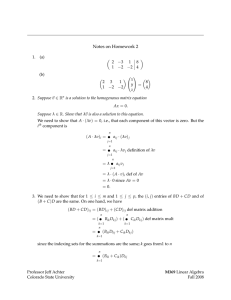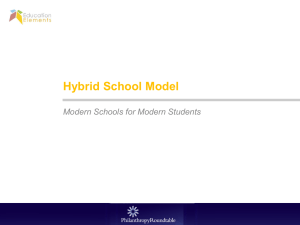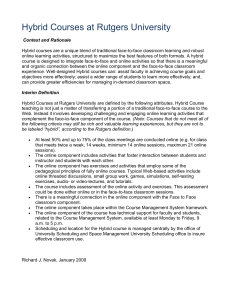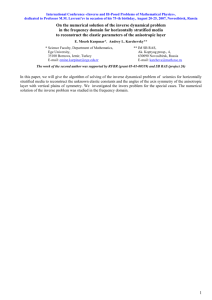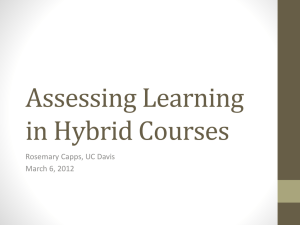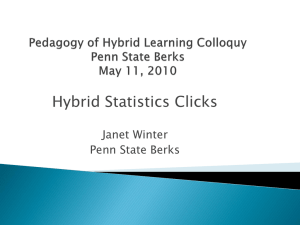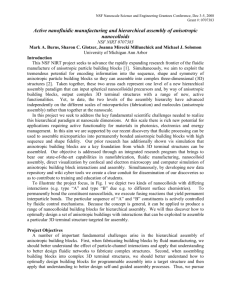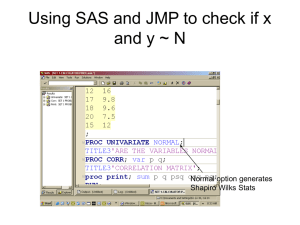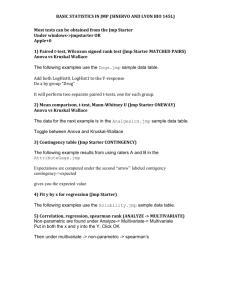Поведінка тришарової симетрично зібраної ортотропної
advertisement
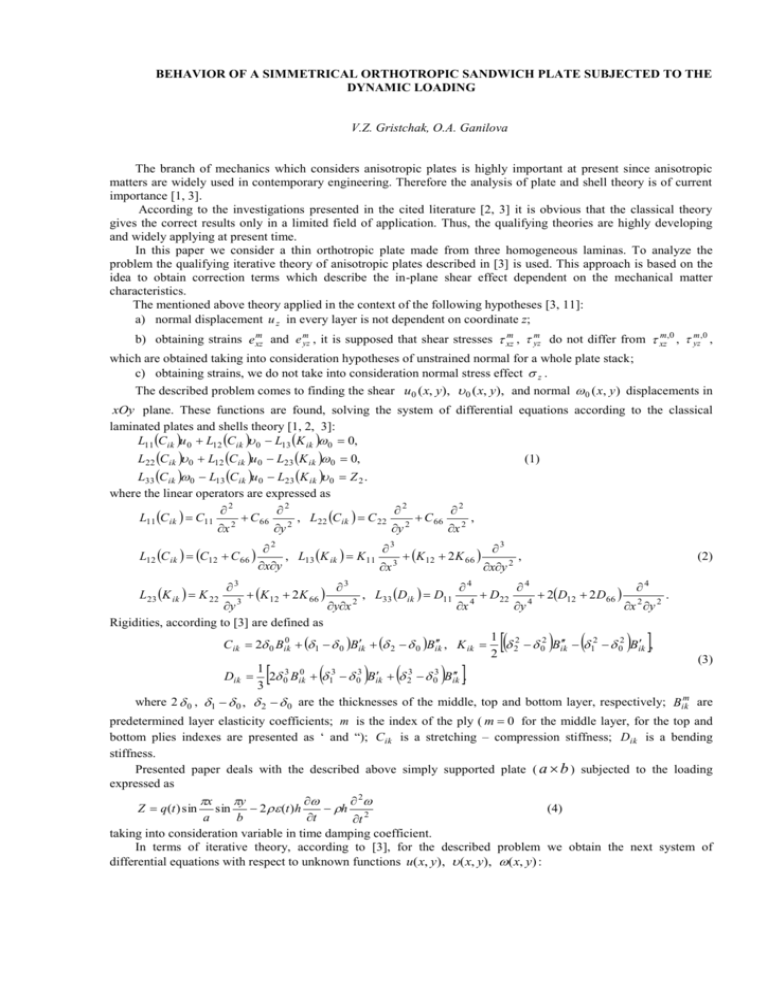
BEHAVIOR OF A SIMMETRICAL ORTHOTROPIC SANDWICH PLATE SUBJECTED TO THE DYNAMIC LOADING V.Z. Gristchak, O.A. Ganilova The branch of mechanics which considers anisotropic plates is highly important at present since anisotropic matters are widely used in contemporary engineering. Therefore the analysis of plate and shell theory is of current importance [1, 3]. According to the investigations presented in the cited literature [2, 3] it is obvious that the classical theory gives the correct results only in a limited field of application. Thus, the qualifying theories are highly developing and widely applying at present time. In this paper we consider a thin orthotropic plate made from three homogeneous laminas. To analyze the problem the qualifying iterative theory of anisotropic plates described in [3] is used. This approach is based on the idea to obtain correction terms which describe the in-plane shear effect dependent on the mechanical matter characteristics. The mentioned above theory applied in the context of the following hypotheses [3, 11]: a) normal displacement u z in every layer is not dependent on coordinate z; m m ,0 m m m,0 b) obtaining strains e xz and e myz , it is supposed that shear stresses xz , yz do not differ from xz , yz , which are obtained taking into consideration hypotheses of unstrained normal for a whole plate stack; c) obtaining strains, we do not take into consideration normal stress effect z . The described problem comes to finding the shear u 0 ( x, y), 0 ( x, y), and normal 0 ( x, y ) displacements in xOy plane. These functions are found, solving the system of differential equations according to the classical laminated plates and shells theory [1, 2, 3]: L11 Cik u 0 L12 Cik 0 L13 K ik 0 0, (1) L22 Cik 0 L12 Cik u 0 L23 K ik 0 0, L33 Cik 0 L13 Cik u 0 L23 K ik 0 Z 2 . where the linear operators are expressed as 2 2 2 2 L11 C ik C11 2 C 66 2 , L22 C ik C 22 2 C 66 2 , x y y x L12 C ik C12 C 66 L23 K ik K 22 3 2 3 3 , L13 K ik K 11 3 K 12 2 K 66 , xy x xy 2 K 12 2 K 66 3 y yx Rigidities, according to [3] are defined as 3 2 , L33 Dik D11 4 x 4 D22 C ik 2 0 Bik0 1 0 Bik 2 0 Bik , K ik (2) 4 y 4 2D12 2 D66 4 x 2 y 2 . 1 2 2 02 Bik 12 02 Bik , 2 (3) 1 3 0 3 3 3 3 Dik 2 0 Bik 1 0 Bik 2 0 Bik . 3 where 2 0 , 1 0 , 2 0 are the thicknesses of the middle, top and bottom layer, respectively; Bikm are predetermined layer elasticity coefficients; m is the index of the ply ( m 0 for the middle layer, for the top and bottom plies indexes are presented as ‘ and “); Cik is a stretching – compression stiffness; Dik is a bending stiffness. Presented paper deals with the described above simply supported plate ( a b ) subjected to the loading expressed as 2 h 2 (4) a b t t taking into consideration variable in time damping coefficient. In terms of iterative theory, according to [3], for the described problem we obtain the next system of differential equations with respect to unknown functions u( x, y), ( x, y), ( x, y) : Z q(t ) sin x sin y 2 (t )h L11 C ik u L12 C ik L13 K ik h 2u L22 C ik L12 C ik u L23 K ik h 2 t 2 t 2 Tx* S * , x y T y* y S * , x 2 * 2H * M y . xy x 2 y 2 The sandwich plate is a symmetrical orthotropic one, therefore, we suppose that 1 2 , Bik Bik Bik and u0 0 0, u 0, L33 Dik L13 K ik u L23 K ik Z 2 M x* (5) 2 Analysis of the problem comes to the solution of the following equation, in terms of the classical theory: 4 0 4 0 4 0 x y 2 D11 2 D 2 D D q ( t ) sin sin 2 ( t ) h h 12 66 22 a b t x 4 x 2 y 2 y 4 t 2 (6) (7) and to another differential equation, in terms of iterative theory: 2 * 2M * 2 H * M y x Z 2 (8) x 2 xy x 4 x 2 y 2 y 4 y 2 Solution of the equations is conducted using the hybrid (Wentzel-Kramer-Brillouin) WKB-Galerkin method which enables to obtain especially good results in approximate solution of differential equation which contains a parameter near the highest order derivative and has already shown its advantages in different branches of mechanics. Hybrid methods have proved to be useful in a wide variety of applications such as structural mechanics problems, applications to slender-body, thermal and structures problems [ 4 – 10, 13, 14 ]. The hybrid WKB-Galerkin method was successfully used in solution of mechanical boundary problems which contained a linear differential equation with variable coefficients and parameter near the highest order derivative. The obtained solution had a pinpoint accuracy and was used in a wide variety of applications. Therefore, the hybrid WKB-Galerkin method, applied to the described differential equations, will give us an opportunity to obtain the approximate solution as an asymptotic one. The results obtained for the classical and iterative theory and compared, varying mechanical matter characteristics and magnitude of the damping coefficient function. D11 4 2D12 2 D66 4 D22 4 References 1. Ambartsumian S. A. General Theory of Anisotropic Shells. – М.: Nauka,1974. – 448p. 2. Ambartsumian S. A. Theory of Anisotropic Shells. – М.: Fizmatgiz,1961. – 384p. 3. Ambartsumian S. A. Theory of Anisotropic Plates. Strength, Stability and Oscillation. – М.: Nauka,1987. – 360p. 4. Geer, J. F.; Andersen, C. M.: Hybrid Perturbation Galerkin Tecnique with Application to Slender Body Theory. SIAM J. Appl. Math., Vol. 49, (1989), 344-361. 5. Geer, J. F.; Andersen, C. M.: A Hybrid Perturbation-Galerkin Method for Differential Equations Containing a Parameter. Pan American Congress on Appl. Mech., (1991), 460-463. 6. Geer, J. F.; Andersen, C. M.: Improved Perturbation Solutions to Nonlinear Partial Differential Equations. Pan American Congress on Appl. Mech. (1991), 567-570. 7. Geer, J. F.; Andersen, C. M.: Natural Frequency Calculations Using A Hybrid Perturbation Galerkin Tecnique. Pan American Congress on Appl. Mech. (1991), 571-574. 8. Geer, J. F.; Andersen, C. M.: A Hybrid Perturbation Galerkin Tecnique with Combined Multiple Expansions. SIAM J. Appl. Math., Vol. 42, (1990). 9. Gristchak, V. Z.: On the Problem of Asimptotic Solutions of Some Buckling and Vibration Problems of the Thin-Walled Constructions with Variable Rigidity, in “Actual Problems in Mechanics of Deformable Media”, Dnepropetrovsk, Ukraine, (1979). 10. Gristchak, V. Z.; Dmitrieva, Ye.: A Hybrid WKB-Galerkin Method and its Application. Technische Mechanik, No. 15, (1995), 281-294. 11. Lehnitskiy S. G. Anisotropic Plates. – М.: Fizmatgiz, 1957. – 463p. 12. Miller S. E., Abramovich H., Oshman Y. Active Distributed Vibration control of Anisotropic Piezoelectric Laminated Plates//Journal of Sound and Vibration. – 1995. – 183(5). – P. 797 – 817. 13. Steel, C. R.: Asymptotic Analysis and Computation for Shells. Analytical and Computational Models of Shells, CED-Vol. 3, New York, (1989). 14. Steel, C. R.: Beams and Shells with Moving Loads. Int. J. Solids Structures 7, (1971), 1171-1198. _____________________________________________________________________________________________ Addresses: Professor Dr. Victor Z. Gristchak, Chairman of Applied Mathematics Department, Faculty of Mathematics, Zaporizhzhya National University, Zhukovskogo st., 66, Zhaporizhzhya, 69063, Ukraine, grk@zsu.zp.ua; Olga A. Ganilova, PhD Candidate, Applied Mathematics Department, Faculty of Mathematics, Zaporizhzhya National University, Zhukovskogo st., 66, Zhaporizhzhya, 69063, Ukraine, lionly@rambler.ru.
